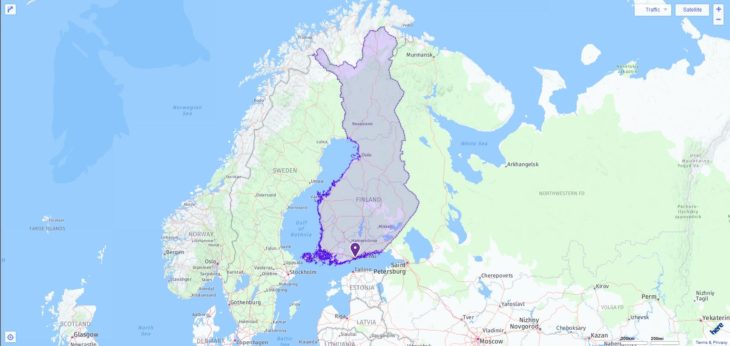Your search found 1 match. The following is the full list of ACT testing locations in Finland among which you can pick one to take the exam. Please know that on the test day, test takers can use any 4-function, scientific, or graphing calculator. On the table below, you can also find all test dates through 2019.

2019-2020 ACT Test Dates in Finland
| Test Date | Registration Deadline |
| February 9, 2019 | January 11, 2019 |
| April 13, 2019 | March 8, 2019 |
| June 8, 2019 | May 3, 2019 |
| July 13, 2019 | June 14, 2019 |
| September 14, 2019 | August 16, 2019 |
| October 26, 2019 | September 20, 2019 |
| December 14, 2019 | November 8, 2019 |
| February 8, 2020 | January 10, 2020 |
| April 4, 2020 | February 28, 2020 |
| June 13, 2020 | May 8, 2020 |
| July 18, 2020 | June 19, 2020 |
ACT Test Centers in Finland
| City | Center Name | Center Code |
| Helsinki | League of Finnish-Am Societies | 866220 |
More about Finland
Finland, Finnish Suomi, Swedish Finland, officially Suomen Tasavalta, Republiken Finland, German Republic of Finland, state in Northern Europe with (2018) 5.5 million residents; The capital is Helsinki.
Military
The total strength of the conscription army (service period 6–12 months) is (2013) around 22,200, that of the paramilitary border guards 2,800 men. The main element of the army (16,000 soldiers) are seven infantry brigades, one third of which is present in times of peace. There are also two tank brigades, three anti-aircraft regiments and 16 engineer battalions. The air force has around 2,700 and the navy 3,500 men. Defense spending represents (2019) 1.3% of gross domestic product (GDP).
Law
Ordinary jurisdiction has three levels. The first instance in civil and criminal matters are (with a few exceptions) the 27 local courts, the first instance of appeal are the 6 appellate courts. The highest instance is the Supreme Court (Korkei oikeus or Högsta domstolen) in Helsinki. Administrative jurisdiction, on the other hand, has two stages; 8 administrative courts form the first instance, the Supreme Administrative Court in Helsinki decides on appeals. In addition, there are special courts with the market court (competition matters and public procurement law), the labor court (only for collective labor law and not for individual actions) and the insurance court (social insurance). There is no constitutional court. – The Finnish legal system is similar to the Swedish one and together with it forms the East Nordic legal system (Nordic legal system), in which, unlike the continental European legal systems in the area of private law, there is no uniform, large codification. Accordingly, Finnish law is characterized by individual laws (some of which are based on joint internordial initiatives) (such as the Contract Act and the Sales Act). Equality between men and women has been achieved in all areas of law; Since 2002, same-sex couples have been able to use the “registered partnership” as a marriage equivalent.
Education
The implementation of Finnish education laws is the responsibility of the Ministry of Education and the National Education Council at the central administrative level. There is general compulsory schooling from the age of 7 to 16 with free lessons. Attending the one-year preschool for children from the age of six is optional and is attended by around 66% of the children. The central element of the school system is the all-day comprehensive school, which all children in grades 1-9 attend. The two official languages, Finnish and Swedish, are compulsory during primary school. With a retention rate of over 99% until the end of primary school, there are almost no early school leavers in Finland. After primary school, 55% of the pupils attend the gymnasiale Oberstufe (general secondary level II, grades 10-12), which leads to higher education entrance qualification. Training within the vocational upper secondary level (3 years), which around 40% of the students choose, can be completed at a vocational school or as an apprenticeship. A technical college entrance qualification is provided at vocational technical colleges. Higher education is offered at 14 universities and 27 technical colleges; the oldest university is the University of Helsinki (founded in 1640 in Turku, moved to Helsinki in 1828). – Public spending on education represents (2012) 7.2% of gross domestic product (GDP).
Parties
Finland traditionally has a multi-party system. On the left of the party spectrum are v. a. the Social Democratic Party of Finland (SDP; founded 1899) and the Left Bund (VAS; founded 1990). The Center Party of Finland (KESK), which was constituted as the Agrarian Union in 1906, developed into a center party that no longer only represents peasant interests, but also urban-bourgeois interests. The National Collection Party (KOK; founded 1918) is a moderately conservative party that advocates free enterprise and private initiative. The Swedish People’s Party (SFP / RKP; founded 1906) traditionally represents the interests of the Swedish minority in Finland. Other movements and parties are the Green Bund (VIHR; founded in 1988), the Christian Democrats of Finland (KD;

